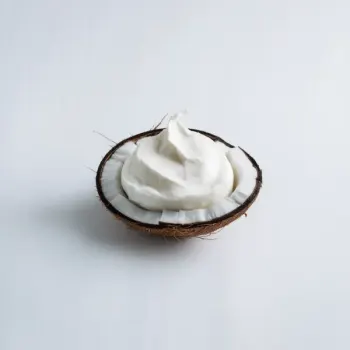Heavy Cream and Coconut Cream are versatile cooking ingredients, with Heavy Cream offering a rich, dairy-based option for luxurious textures and Coconut Cream providing a plant-based, tropical alternative for sweet and creamy dishes.

Heavy cream, also known as heavy whipping cream, is a rich dairy product with a high fat content. It's versatile and can be whipped into peaks or added to sauces for a luxurious texture.

Coconut cream is a thick, creamy substance made from the flesh of coconuts. It's a staple in many tropical cuisines and is cherished for its natural sweetness and rich texture.
Heavy cream is dairy-based with a smooth, velvety texture and mild flavor, while coconut cream is plant-based, imparting a tropical flavor. Their textures are similar, but their flavor profiles and culinary uses can be quite different.

Your ultimate Recipe Box, Meal Planner, and Cooking Class all in one
Best used in: Creamy tomato soup, chowders, beef stroganoff. It adds a rich, velvety mouthfeel. When added, expect a comforting, hearty flavor. Tip: Stir in heavy cream at the end of cooking to prevent curdling. Best used in: Thai curries, pumpkin soup, lentil stew. It introduces a tropical twist. Expect a delightful sweetness and creamy thickness. Tip: Use coconut cream to create a vegan alternative to traditional creamy soups.
Best used in: Mousses, ganache, ice cream. It provides a neutral, rich base. Expect smooth and indulgent desserts. Tip: Whip the cream to stiff peaks for airy textures in mousses and toppings. Best used in: Vegan desserts, panna cotta, tropical fruit tarts. It offers a subtle coconut flavor. Expect desserts with a distinct, exotic taste. Tip: Chill coconut cream before whipping for the best consistency.
Best used in: Alfredo sauce, carbonara, cheese dips. It creates a rich and smooth texture. Expect a decadent and creamy sauce. Tip: Simmer heavy cream to thicken sauces without needing a roux. Best used in: Satay sauce, vegan queso, tropical dips. It adds a creamy body with a hint of sweetness. Expect a unique flavor profile. Tip: Balance the sweetness with citrus or spice for a more complex sauce.
While you can substitute coconut cream for heavy cream to achieve a similar consistency, expect a change in flavor profile. Coconut cream will impart a tropical taste which may not be ideal in all recipes. In vegan or lactose-intolerant scenarios, coconut cream is a fantastic alternative to heavy cream.
Heavy cream is rich in dairy fats and cholesterol, while coconut cream offers plant-based fats and may be more suitable for those avoiding dairy.
| Nutrient | Heavy Cream ( per 100ml ) | Coconut Cream ( per 100ml ) |
|---|---|---|
| Fat | 37g | 35g |
| Sodium | 39mg | 20mg |
| Calcium | 64mg | 15mg |
| Protein | 2.1g | 3.3g |
| Calories | 345 | 330 |
| Carbohydrates | 2.9g | 4.3g |
Coconut cream can be used as a substitute for heavy cream to mimic texture, but it will impart a coconut flavor that may not be desired in every recipe.
Healthiness is subjective and depends on dietary needs. Coconut cream is dairy-free and vegan, while heavy cream is richer in cholesterol and dairy fats.
Yes, you can whip chilled coconut cream much like heavy cream, but it may have a slightly different texture and taste due to its coconut content.
Coconut cream is less prone to curdling than heavy cream due to its different protein composition but should still be added with care to hot mixtures.
Both can be used in coffee. Heavy cream will add richness without much flavor change, whereas coconut cream will add a coconut taste.
You can, but it will lack the characteristic coconut flavor of many curry dishes, and the outcome will be a richer, dairy-based curry.